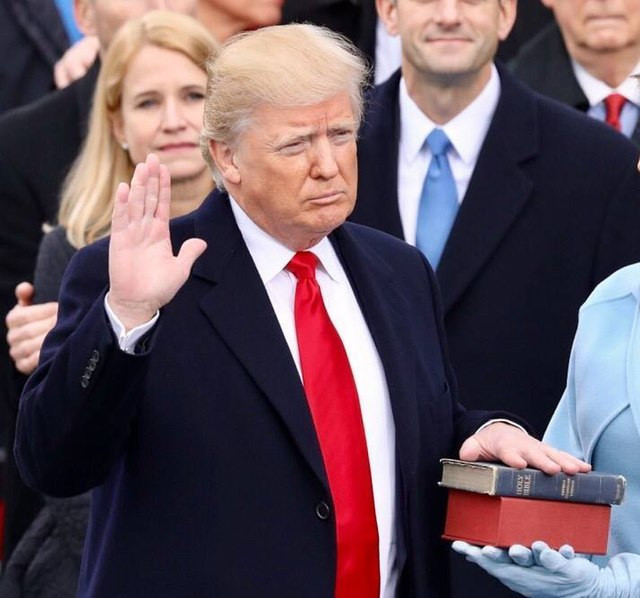Former President Donald Trump's "God Bless the USA" Bibles, promoted as a symbol of American patriotism and faith, were revealed to have been printed in China, despite his long-standing criticism of the country's trade practices. According to trade records reviewed by the Associated Press, nearly 120,000 of these Bibles were produced by a printing company in Hangzhou, China, and shipped to the United States earlier this year.
The cost of these shipments, valued at around $342,000, translates to less than $3 per Bible, highlighting the stark contrast between their production cost and their retail price. Trump's Bibles are sold for $59.99 each, with some versions costing as much as $1,000 if signed by the former president, generating potential sales revenue of approximately $7 million. The revelation of their Chinese origin has sparked criticism given Trump's history of denouncing China for allegedly undermining American manufacturing.
The controversy comes as Trump continues to push an agenda that emphasizes the return of American manufacturing jobs and economic independence from China. During his presidency, Trump frequently imposed tariffs on Chinese imports, arguing that such measures were necessary to protect American workers. Yet, his decision to have the "God Bless the USA" Bibles printed in China has drawn accusations of hypocrisy from critics and raised questions about his true commitment to his own economic policies.
In a video posted on his social media platform Truth Social, Trump emphasized the importance of religion in America's revival, stating, "Religion and Christianity are the biggest things missing from this country. We need to bring them back fast." He did not mention that the Bibles were manufactured abroad. The video also promoted the Bible as a product that combines American patriotic texts like the Constitution and the Declaration of Independence with Christian scripture, using Lee Greenwood's iconic song "God Bless the USA" as inspiration.
While Trump was president, his administration notably exempted Bibles and other religious texts from tariffs imposed on billions of dollars worth of Chinese goods, a move that some critics now view as a way to benefit his business ventures. The exemption allowed the Bible production to continue in China without facing the financial penalties that other imports from the country were subjected to, raising concerns about potential conflicts of interest.
Critics have also taken issue with the integration of religious themes with political messaging in the Trump Bible. Brian Kaylor, a Baptist minister and president of the Christian media company Word&Way, criticized the project, calling it a "toxic mix" that fuels Christian nationalism. "Taking what has long been understood as a global message religiously and stamping it with the flag of one nation is the type of thing that for centuries theologians would call heresy," Kaylor said, highlighting the dangerous merging of faith and nationalism.
The King James Version of the Bible, used in the Trump-backed edition, is in the public domain, allowing it to be freely reproduced. Originally, the publishers intended to use the New International Version, licensed by HarperCollins Christian Publishing, but HarperCollins withdrew from the project following backlash from religious scholars who opposed the combination of religious text with government documents. They argued that such a merger promotes the idea of America as a Christian nation, a sentiment often linked to Christian nationalist ideologies.
Further scrutiny of the manufacturing process revealed that the printing was carried out by New Ade Cultural Media, a Chinese company based in Hangzhou, known for its specialization in custom Bible production. Tammy Tang, a sales representative for New Ade, confirmed that the company produced the Bibles for a U.S.-based client but declined to disclose additional details, citing confidentiality agreements.
The use of Chinese manufacturing for Trump's patriotic product has amplified criticisms about his inconsistencies regarding China. While he has accused China of undermining American workers and threatened tougher economic policies if re-elected, his personal ventures continue to leverage China's manufacturing capabilities to maximize profits. This contradiction has not gone unnoticed by political analysts, who point out the potential conflicts of interest inherent in his business dealings.
Trump's approach to mixing religion and commerce also drew rebukes from ethical experts. Claire Finkelstein, founder of the nonpartisan Center for Ethics and the Rule of Law, questioned the legality of selling products tied so closely to a political figure. "Selling Bibles as a for-profit venture while potentially benefiting politically raises serious ethical concerns," Finkelstein noted. "It blurs the line between personal gain and campaign finance, which could be problematic if foreign interests are involved."
While Trump has remained silent on the issue, his business arrangement with CIC Ventures-a company he owns and from which he receives royalties for the use of his name on the Bible-continues to raise eyebrows. CIC Ventures reportedly earned $300,000 in royalties from Bible sales, though it is unclear how much Trump has made since his financial disclosures were released.






